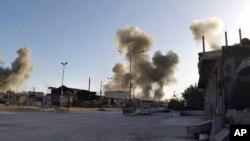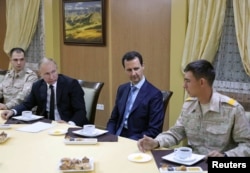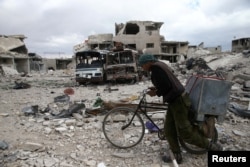U.S. President Donald Trump blamed Russian President Vladimir Putin and Iran on Sunday for a "mindless chemical attack" in Syria that killed at least 40 people, vowing there would be a "big price to pay."
In a rare direct condemnation of the Russian leader, Trump declared, "President Putin, Russia and Iran are responsible" for their support of "Animal Assad," Syrian President Bashar al-Assad.
"Big price to pay," Trump said in one of a string of Twitter comments. "Open area immediately for medical help and verification. Another humanitarian disaster for no reason whatsoever. SICK!"
Trump did not say how the U.S. might respond. But Homeland Security and counterterrorism adviser Thomas Bossert told ABC News, “I wouldn’t take anything off the table,” leaving open the possibility of a new missile strike like the one Trump ordered a year ago after another Syrian chemical weapons attack.
The United Nations Security Council will meet Monday about the alleged attack, after nine countries demanded an urgent session. The European Union said "evidence points toward yet another chemical attack" by the Syrian regime.
Trump described the area where the "atrocity" occurred in Douma near the Syrian capital, Damascus, as "in lockdown and encircled by Syrian Army, making it completely inaccessible to outside world."
But Trump also said that if his predecessor, former President Barack Obama, "had crossed his stated Red Line In The Sand," to hold Assad accountable for previous chemical attacks, "the Syrian disaster would have ended long ago! Animal Assad would have been history!"
Trump's rebuke of Putin was unusual.
The U.S. leader has been reluctant during his nearly 15-month presidency to accept the conclusion of the U.S. intelligence community that Putin directed a 2016 campaign to meddle in the U.S. presidential election to help Trump win. U.S. special counsel Robert Mueller has been conducting a wide-ranging criminal investigation of the Trump campaign's links to Russia, but Trump has repeatedly rejected the notion there was any collusion with Russia.
The alleged chemical attack, denied by both the Syrian government and Russia, occurred late Saturday amid new attacks on the last rebel enclave in eastern Ghouta.
Trump's rebuke of Putin was unusual.
The U.S. leader has been reluctant during his nearly 15-month presidency to accept the conclusion of the U.S. intelligence community that Putin directed a 2016 campaign to meddle in the U.S. presidential election to help Trump win. U.S. special counsel Robert Mueller has been conducting a wide-ranging criminal investigation of the Trump campaign's links to Russia, but Trump has repeatedly rejected the notion there was any collusion with Russia.
The alleged chemical attack, denied by both the Syrian government and Russia, occurred late Saturday amid new attacks on the last rebel enclave in eastern Ghouta.
First responders said they discovered families suffocated in their homes and shelters with foam on their mouths. Relief workers said more than 500 people, mostly women and children, were brought to medical centers with difficulty breathing, foaming at the mouth and their eyes burning.
The Civil Defense and Syrian American Medical Society said patients gave off a chlorine-like smell, and some had blue skin, an indication of oxygen deprivation.
The Russian Foreign Ministry rejected claims of a chemical attack, saying, "The spread of bogus stories about the use of chlorine and other poisonous substances by [Syrian] government forces continues.
"We have warned several times recently against such dangerous provocations," the Moscow statement said. "The aim of such deceitful speculation, lacking any kind of grounding, is to shield terrorists and to attempt to justify possible external uses of force."
Iran said U.S. claims about the attack were aimed at justifying new American military action. A year ago, after an earlier chemical weapons attack by Syria, Trump launched 59 Tomahawk missiles into Syria, targeting the military base that was home to the warplanes that carried out the attack.
Trump's rebuff of Putin and Iran, which has forces in Syria, came as Syrian state television said Sunday an agreement has been reached for rebels to leave Douma, their last stronghold near Damascus.
The accord calls for the Jaish al-Islam fighters to release all prisoners they were holding in exchange for passage within 48 hours to the opposition-held town of Jarablus in northern Syria near the Turkish border. Russia said last week that Jaish al-Islam accepted a deal to leave Ghouta, which houses tens of thousands of people. However, the evacuations stalled over reports that the rebel group remained divided over the withdrawal.
The pact was reached just hours after the suspected chemical attack.
In Rome, Pope Francis condemned the use of chemical weapons in Syria, "There is not a good war and a bad one, and nothing, nothing can justify the use of such devices of extermination against defenseless people and populations."
Even before Trump responded to the suspected chemical attack to blame Putin, the U.S. State Department had said, "Russia, with its unwavering support for the regime, ultimately bears responsibility for these brutal attacks, targeting of countless civilians, and the suffocation of Syria's most vulnerable communities with chemical weapons."








